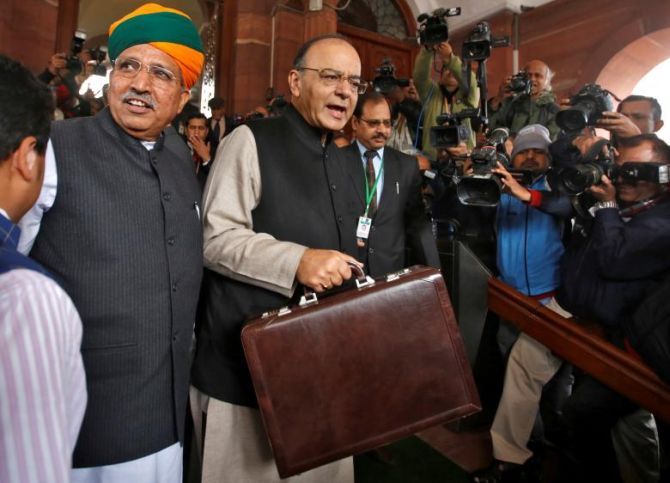 | « Back to article | Print this article |
Pensioners, India Inc may get tax breaks in Budget

The political message of Union Budget 2018-19 is expected to be consolidating the gains from the big-ticket changes of the past three years rather than introducing radical departures.
This is the conclusion of top officials as the finance ministry wraps itself up in the veil of secrecy two months before the Budget is read in Parliament by the finance minister.
However, the one area in which some changes could be possible is direct tax rates for the corporate sector.
Also a proposal the finance ministry has acknowledged it is working on is offering larger tax sops to pensioners, a politically rising power group.
“We have gone through a series of steps in the past three years to bring some major changes in the economy. It is time to offer a pause,” said an official involved in the Budget exercise.
The government would instead harp on the pace of progress of the nationwide road-building programme and the anticipated fulfilment of building 10 million houses for the poor under the scheme “Housing for All”.
The expected deadline for the latter is December 2018.
He said other than the Goods and Services Tax (GST) and demonetisation, the government had reformed the banking sector, and the reforms included insolvency rules and simplified foreign investment procedures.
It had also reformed the fertiliser sector, along with bringing in improvements in ease of doing business, all of which had begun to demonstrate their usefulness for the economy.
Course corrections would have to wait for one more fiscal year to elapse, he said.
The pause has become necessary because the GST numbers, while on the upswing, still have a long way to go before a call is made on their trends.
While the Controller General of Accounts this month would be feeding the ministry almost daily reports of receipts, officers want to stretch the date for making a final call on them to mid-January.
The latest numbers show collection for October was down 9.5 per cent from Rs 92,150 crore achieved for September.
The annual target on the basis of published Budget Estimates of the ministry for 2017-18 is 14 per cent growth over the receipts for 2016-17.
There is little room available to make fiscal manoeuvres after Moody’s thumbs up.
The officer said while the government had noted the sharp drop to 20 per cent in the corporation tax rate in the US, cleared by the Senate last week, the pressure on India to follow suit immediately was limited.
“There are advantages India offers of cheaper cost of production, which remain. We are adding to them by improvement in ease of doing business,” he said.
The ministry will, however, consider if it needs to balance the announcement of the stick of National Anti-Profiteering Authority with that of a carrot of tax sops for companies.
In 2015-16 the ministry had clipped the headline rate of the corporation tax to 25 per cent for new units in the manufacturing sector.
Jaitley promised that the new manufacturing companies that did not avail of any exemption would be charged only 25 per cent and included the MSMEs in the 25 per cent club in 2017-18.
The ministry is exploring ways to add more categories here, short of a blanket move to migrate all units to the lower rate.
In a letter addressed to Congress MP Shashi Tharoor, the minister of state for finance, Shiv Pratap Shukla, has said the ministry has received representations to raise the income tax exemption limit for pensioners with an annual income of Rs 500,000.
“The proposal would be examined during the exercise for the ensuing Union Budget, 2018…”, his reply notes.
A key member of the government’s financial sector noted that the NDA government, in this term, had not used the Budget to make any significant announcements on reforms.
It is because party (BJP) managers believe that the political dividend that can be generated through Budget announcements is limited.
Former finance secretary Ashok Chawla said he expected the budget would attempt to further push PSU expenditure because that was the only short-term instrument available.
"The effort will be to lift the dark clouds as much as is possible," he said.
The four Budgets have instead been used to offer directions on the impact of the changes made through the fiscal deficit and the consequent expenditure and tax policies.
“I expect the trend will continue this year too.”
According to him, the government could announce changes later in the year on the agriculture and rural sector.
Sectors in which the Centre needs explicit support from state governments, like those in health, land, and also labour, are likely to be on mute as the time available till the general elections due in April-May 2019 does not offer the space to demonstrate returns.
Photograph: Adnan Abidi/Reuters